Synopsis
Tancred, Lord Montacute, the novel's idealistic young hero, seems destined to live the life of a conventional member of the British ruling class. Dissatisfied with his life in fashionable London circles, he instead leaves his parents and retraces the steps of his Crusader ancestors to the Holy Land, hoping there to "penetrate the great Asian mystery" [2] and understand the roots of Christianity. He meets the beautiful Eva, daughter of a Jewish financier, and becomes involved in the political machinations of her foster-brother, the brilliant Fakredeen, a Lebanese emir. At Fakredeen's instigation Tancred is kidnapped and held captive, but is nevertheless allowed to visit Mount Sinai. He then has a vision of an angel who tells him he must be the prophet of "the sublime and solacing doctrine of theocratic equality", [3] a concept which Disraeli leaves somewhat hazy. Tancred falls ill, and is released at the instigation of Eva, who nurses him back to health. She teaches him about the glories of Mediterranean civilization and the debt that Christianity owes to Judaism. Tancred, in love with Eva and utterly convinced that she is right, proposes marriage, but the romance is broken off when his parents appear to reclaim their son and take him back to England.

Benjamin Disraeli, 1st Earl of Beaconsfield, was a British statesman, Conservative politician and writer who twice served as Prime Minister of the United Kingdom. He played a central role in the creation of the modern Conservative Party, defining its policies and its broad outreach. Disraeli is remembered for his influential voice in world affairs, his political battles with the Liberal Party leader William Ewart Gladstone, and his one-nation conservatism or "Tory democracy". He made the Conservatives the party most identified with the British Empire and military action to expand it, both of which were popular among British voters. He is the only British Prime Minister to have been born Jewish.

Edward George Earle Lytton Bulwer-Lytton, 1st Baron Lytton,, was an English writer and politician. He served as a Whig member of Parliament from 1831 to 1841 and a Conservative from 1851 to 1866. He was Secretary of State for the Colonies from June 1858 to June 1859, choosing Richard Clement Moody as founder of British Columbia. He was created Baron Lytton of Knebworth in 1866.
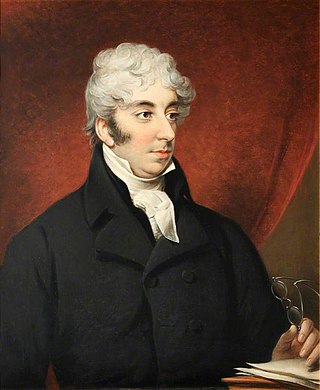
Isaac D'Israeli was a British writer, scholar and the father of British prime minister Benjamin Disraeli. He is best known for his essays and his associations with other men of letters.
Tancred or Tankred is a masculine given name of Germanic origin that comes from thank- (thought) and -rath (counsel), meaning "well-thought advice". It was used in the High Middle Ages mainly by the Normans and especially associated with the Hauteville family in Italy. It is rare today as a first name, but still common as a Norman surname: Tanqueray, Tanquerey, Tanqueret. Its Italian form is Tancredi and in Latin it is Tancredus. Its Italian patronymic is also Tancredi.
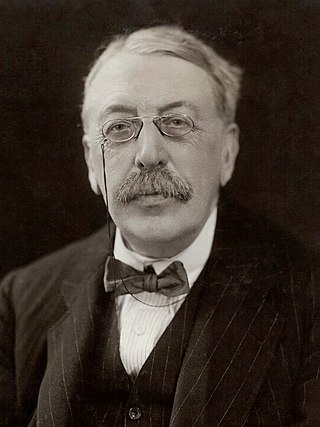
Sir Charles Villiers Stanford was an Anglo-Irish composer, music teacher, and conductor of the late Romantic era. Born to a well-off and highly musical family in Dublin, Stanford was educated at the University of Cambridge before studying music in Leipzig and Berlin. He was instrumental in raising the status of the Cambridge University Musical Society, attracting international stars to perform with it.

Spencer Compton Cavendish, 8th Duke of Devonshire,, styled Lord Cavendish of Keighley between 1834 and 1858 and Marquess of Hartington between 1858 and 1891, was a British statesman. He has the distinction of having held leading positions in three political parties: leading the Liberal Party, the Liberal Unionist Party and the Conservative Party in either the House of Commons or the House of Lords. After 1886 he increasingly voted with the Conservatives. He declined to become prime minister on three occasions, because the circumstances were never right. Historian and politician Roy Jenkins said he was "too easy-going and too little of a party man." He held some passions, but he rarely displayed them regarding the most controversial issues of the day.

The history of the Jews in England goes back to the reign of William the Conqueror. Although it is likely that there had been some Jewish presence in the Roman period, there is no definitive evidence, and no reason to suppose that there was any community during Anglo-Saxon times. The first written record of Jewish settlement in England dates from 1070. The Jewish settlement continued until King Edward I's Edict of Expulsion in 1290.
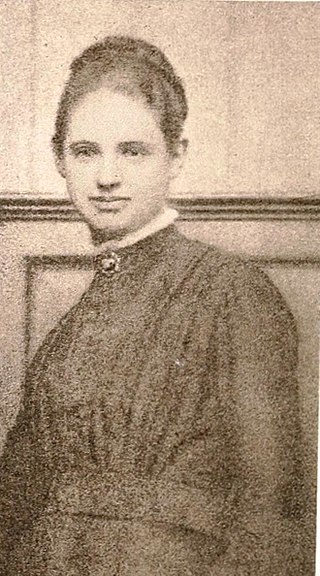
Mary Coleridge was a British novelist and poet who also wrote essays and reviews. She wrote poetry under the pseudonym Anodos. Other influences on her were Richard Watson Dixon and Christina Rossetti. Robert Bridges, the Poet Laureate, described her poems as 'wonderously beautiful… but mystical rather than enigmatical'.

Tancred was an Italo-Norman leader of the First Crusade who later became Prince of Galilee and regent of the Principality of Antioch. Tancred came from the house of Hauteville and was the great-grandson of Norman lord Tancred of Hauteville.

Sharon Turner was an English historian.
Young England was a Victorian era political group with a political message based on an idealised feudalism: an absolute monarch and a strong Established Church, with the philanthropy of noblesse oblige as the basis for its paternalistic form of social organisation. For the most part, its unofficial membership was confined to a splinter group of Tory aristocrats who had attended Eton and Cambridge together, among them George Smythe, Lord John Manners, Henry Thomas Hope and Alexander Baillie-Cochrane. The group's leader and figurehead was Benjamin Disraeli, who bore the distinction of having neither an aristocratic background nor a public school or university education. Young England promulgated a conservative and romantic species of social Toryism.

The Public Worship Regulation Act 1874 was an act of Parliament of the United Kingdom, introduced as a Private Member's Bill by Archbishop of Canterbury Archibald Campbell Tait, to limit what he perceived as the growing ritualism of Anglo-Catholicism and the Oxford Movement within the Church of England. The bill was strongly endorsed by Prime Minister Benjamin Disraeli, and vigorously opposed by Liberal party leader William Ewart Gladstone. Queen Victoria strongly supported it. The law was seldom enforced, but at least five clergymen were imprisoned by judges for contempt of court, which greatly embarrassed the Church of England archbishops who had vigorously promoted it.
Coningsby, or The New Generation is an English political novel by Benjamin Disraeli, published in 1844.

Sybil, or The Two Nations is an 1845 novel by Benjamin Disraeli. Published in the same year as Friedrich Engels's The Condition of the Working Class in England in 1844, Sybil traces the plight of the working classes of England. Disraeli was interested in dealing with the horrific conditions in which the majority of England's working classes lived — or, what is generally called the Condition of England question.
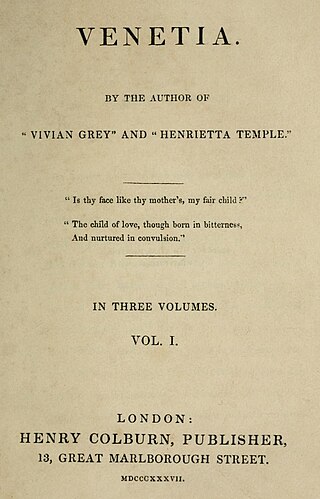
Venetia is a minor novel by Benjamin Disraeli, published in 1837, the year he was first elected to the House of Commons.

English literature is literature written in the English language from the English-speaking world. The English language has developed over more than 1,400 years. The earliest forms of English, a set of Anglo-Frisian dialects brought to Great Britain by Anglo-Saxon invaders in the fifth century, are called Old English. Beowulf is the most famous work in Old English. Despite being set in Scandinavia, it has achieved national epic status in England. However, following the Norman conquest of England in 1066, the written form of the Anglo-Saxon language became less common. Under the influence of the new aristocracy, French became the standard language of courts, parliament, and polite society. The English spoken after the Normans came is known as Middle English. This form of English lasted until the 1470s, when the Chancery Standard, a London-based form of English, became widespread. Geoffrey Chaucer (1343–1400), author of The Canterbury Tales, was a significant figure developing the legitimacy of vernacular Middle English at a time when the dominant literary languages in England were still French and Latin. The invention of the printing press by Johannes Gutenberg in 1439 also helped to standardise the language, as did the King James Bible (1611), and the Great Vowel Shift.

Margaret Hunt was a British novelist and translator of the tales of the Brothers Grimm.
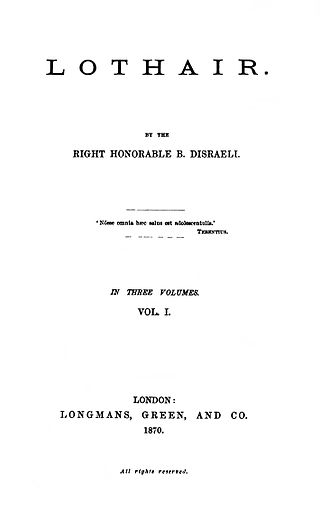
Lothair (1870) was a late novel by Benjamin Disraeli, the first he wrote after his first term as Prime Minister. It deals with the comparative merits of the Catholic and Anglican churches as heirs of Judaism, and with the topical question of Italian unification. Though Lothair was a hugely popular work among 19th century readers, it now to some extent lies in the shadow of the same author's Coningsby and Sybil. Lothair reflects anti-Catholicism of the sort that was popular in Britain, and which fueled support for Italian unification ("Risorgimento").
Jonathan Philip Parry, commonly referred to as Jon Parry, is professor of Modern British History at the University of Cambridge and Fellow of Pembroke College. He has specialised in 19th and 20th century British political and cultural history and has developed a later interest in the relationship between Britain and the Ottoman Empire.

Charles Auchester is a novel by Elizabeth Sara Sheppard, published in 1853. Its hero is an idealised portrait of the composer Felix Mendelssohn. The novel, which is notable for its positive portrayal of Jewish musicality, was praised by Benjamin Disraeli and was initially very popular, remaining in print for over seventy years.
















